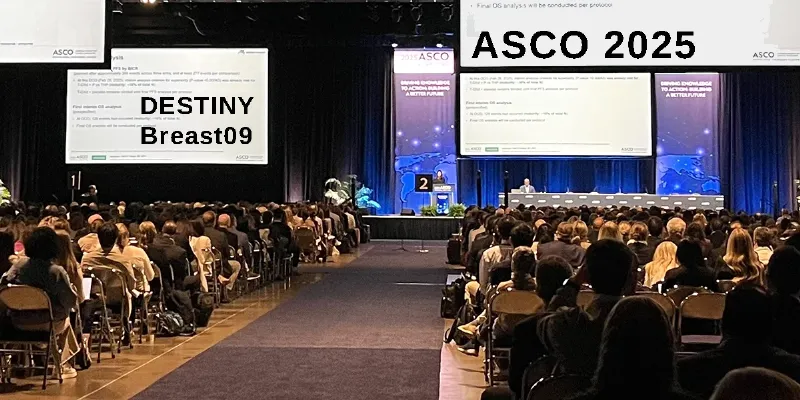Enhertu-pertuzumab Combo Shows 44% Risk Reduction in HER2+ Breast Cancer

3 June 2025
Presented at ASCO 2025, new data from the DESTINY-Breast09 trial showed that Enhertu plus pertuzumab cut the risk of disease progression or death by 44% compared to taxane, trastuzumab, and pertuzumab (THP) in first-line treatment for HER2-positive metastatic breast cancer. Median PFS exceeded three years (40.7 vs. 26.9 months), with an 85.1% objective response rate.
In the landscape of HER2-positive metastatic breast cancer — a disease marked by rapid progression and limited long-term survival — the DESTINY-Breast09 Phase III trial offers a ray of hope. Announced during a late-breaking session at the 2025 ASCO Annual Meeting, the interim results of this pivotal study reveal a 44% reduction in the risk of disease progression or death with the combination of trastuzumab deruxtecan (Enhertu) and pertuzumab, compared to the current first-line standard of care.
A Three-Year Milestone in Progression-Free Survival
The magnitude of benefit observed in DESTINY-Breast09 is striking. In this global, randomized trial of 1,157 patients with HER2-positive advanced or metastatic breast cancer, Enhertu plus pertuzumab achieved a median progression-free survival (PFS) of 40.7 months — surpassing the 26.9 months seen with taxane, trastuzumab, and pertuzumab (THP). This difference, assessed by blinded independent central review, translates into a hazard ratio of 0.56 (95% CI, 0.44–0.71; p<0.00001), signaling a highly statistically significant and clinically meaningful benefit.
Investigator-assessed data mirrored this advantage, with a median PFS of 40.7 months versus 20.7 months in the THP arm (HR 0.49; 95% CI, 0.39–0.61). Notably, the PFS benefit was consistent across key subgroups — including patients with de novo or recurrent disease, hormone receptor status, and PIK3CA mutation status — reinforcing the robustness of the results.
Dr. Sara Tolaney, emphasized the potential paradigm shift these data represent: “Patients with HER2-positive metastatic breast cancer often experience disease progression around two years after initiating standard-of-care first-line treatment. With a median progression-free survival of more than three years, the DESTINY-Breast09 results show trastuzumab deruxtecan combined with pertuzumab has the potential to become a new first-line standard of care for these patients.”
Deep and Durable Responses
The data also highlight an impressive objective response rate (ORR) of 85.1% with the Enhertu-pertuzumab combination, compared to 78.6% with THP. The depth of response is further illustrated by the higher number of complete responses: 58 in the Enhertu arm versus 33 in the standard-of-care arm. More importantly, these responses were durable, with a median duration exceeding three years (39.2 months), compared to 26.4 months for THP.
Although overall survival data remain immature at this interim analysis (16% maturity), early trends favor the Enhertu combination (HR 0.84; 95% CI, 0.59–1.19), hinting at a potential survival benefit that may emerge with longer follow-up.
“Given the near doubling of the duration of disease control with the use of T-DXd plus pertuzumab compared to the current standard, THP, there are plans to engage with health authorities and follow the process for regulatory approval. This would represent a paradigm shift, as THP has been a standard therapy approach for over a decade for [first-line] treatment of metastatic HER2-positive breast cancer,” Dr. Tolaney stated.
Safety Profile and Clinical Implications
The safety profile of Enhertu plus pertuzumab was consistent with the known effects of each agent. The most notable adverse event was interstitial lung disease (ILD)/pneumonitis, observed in 12.1% of patients receiving Enhertu. Importantly, most ILD cases were low grade (Grade 1 or 2), with only two Grade 5 events reported.
“Bringing Enhertu earlier in the treatment of HER2-positive metastatic breast cancer may represent an important advancement for patients. The DESTINY-Breast09 trial showed the combination of Enhertu and pertuzumab in the first-line setting substantially increased the amount of time before a patient’s cancer progressed compared to standard of care and nearly doubled the number of patients showing no signs of disease on imaging,” sadi Susan Galbraith, Executive Vice President of Oncology R&D at AstraZeneca.
A Transformative Option on the Horizon
For a patient population with historically limited treatment durability, the DESTINY-Breast09 trial represents the first meaningful advance in over a decade. With median follow-up of 29.2 months and nearly 40% of patients still on therapy at the time of data cut-off, the long-lasting control observed is both unprecedented and promising.
“Enhertu continues to transform the treatment of metastatic breast cancer with the first new data in more than a decade to demonstrate improved outcomes for a broad population of patients with HER2-positive disease compared to THP in the first-line setting. DESTINY-Breast09 shows that initiating treatment with Enhertu in combination with pertuzumab at the time of metastatic diagnosis can delay disease progression,” said Ken Takeshita, Global Head, R&D, Daiichi Sankyo.











Comments
No Comments Yet!